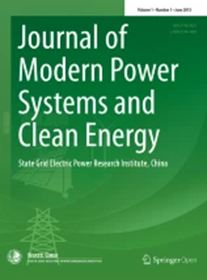A Hybrid Data-Driven Approach Integrating Temporal Fusion Transformer and Soft Actor-Critic Algorithm for Optimal Scheduling of Building Integrated Energy Systems
IF 6.1
1区 工程技术
Q1 ENGINEERING, ELECTRICAL & ELECTRONIC
Journal of Modern Power Systems and Clean Energy
Pub Date : 2025-01-28
DOI:10.35833/MPCE.2024.000909
引用次数: 0
Abstract
Building integrated energy systems (BIESs) are pivotal for enhancing energy efficiency by accounting for a significant proportion of global energy consumption. Two key barriers that reduce the BIES operational efficiency mainly lie in the renewable generation uncertainty and operational non-convexity of combined heat and power (CHP) units. To this end, this paper proposes a soft actor-critic (SAC) algorithm to solve the scheduling problem of BIES, which overcomes the model non-convexity and shows advantages in robustness and generalization. This paper also adopts a temporal fusion transformer (TFT) to enhance the optimal solution for the SAC algorithm by forecasting the renewable generation and energy demand. The TFT can effectively capture the complex temporal patterns and dependencies that span multiple steps. Furthermore, its forecasting results are interpretable due to the employment of a self-attention layer so as to assist in more trustworthy decision-making in the SAC algorithm. The proposed hybrid data-driven approach integrating TFT and SAC algorithm, i.e., TFT-SAC approach, is trained and tested on a real-world dataset to validate its superior performance in reducing the energy cost and computational time compared with the benchmark approaches. The generalization performance for the scheduling policy, as well as the sensitivity analysis, are examined in the case studies.基于时间融合变压器和软行为者评判算法的建筑综合能源系统优化调度混合数据驱动方法
建筑综合能源系统(BIESs)占全球能源消耗的很大比例,对提高能源效率至关重要。影响双热电联产运行效率的两个关键障碍主要是可再生能源发电的不确定性和热电联产机组的运行非凸性。为此,本文提出了一种软actor-critic (SAC)算法来解决BIES调度问题,该算法克服了模型的非凸性,具有鲁棒性和泛化性。本文还采用时序融合变压器(TFT)对可再生能源发电和能源需求进行预测,增强SAC算法的最优解。TFT可以有效地捕获跨越多个步骤的复杂时间模式和依赖关系。此外,由于采用了自关注层,其预测结果是可解释的,从而有助于SAC算法中更可信的决策。结合TFT和SAC算法提出的混合数据驱动方法,即TFT-SAC方法,在真实数据集上进行了训练和测试,验证了与基准方法相比,其在降低能耗和计算时间方面的优越性能。通过实例分析,验证了调度策略的泛化性能和灵敏度分析。
本文章由计算机程序翻译,如有差异,请以英文原文为准。
求助全文
约1分钟内获得全文
求助全文
来源期刊

Journal of Modern Power Systems and Clean Energy
ENGINEERING, ELECTRICAL & ELECTRONIC-
CiteScore
12.30
自引率
14.30%
发文量
97
审稿时长
13 weeks
期刊介绍:
Journal of Modern Power Systems and Clean Energy (MPCE), commencing from June, 2013, is a newly established, peer-reviewed and quarterly published journal in English. It is the first international power engineering journal originated in mainland China. MPCE publishes original papers, short letters and review articles in the field of modern power systems with focus on smart grid technology and renewable energy integration, etc.
 求助内容:
求助内容: 应助结果提醒方式:
应助结果提醒方式:


